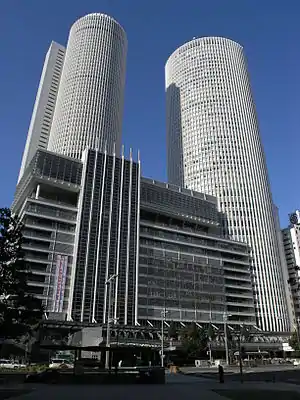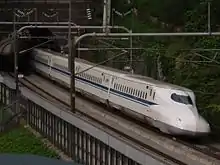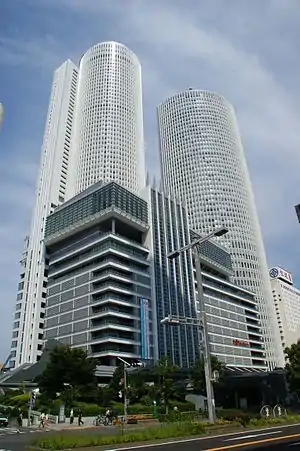Central Japan Railway Company
The Central Japan Railway Company (東海旅客鉄道株式会社, Tōkai Ryokaku Tetsudō Kabushiki-gaisha, lit. "Tōkai Passenger Railway Stock Company") is the main railway company operating in the Chūbu (Nagoya) region of central Japan. It is officially abbreviated in English as JR Central and in Japanese as JR Tōkai (JR東海). Tōkai is a reference to the geographical region in which the company chiefly operates.
.svg.png.webp) | |
 The JR Central Towers company headquarters located above Nagoya Station | |
Native name | 東海旅客鉄道株式会社 |
|---|---|
Romanized name | Tōkai Ryokaku Tetsudō (lit. "Tōkai Passenger Railway") kabushiki gaisha |
| Type | Public (KK) |
| Industry | Private railway |
| Predecessor | Japanese National Railways (JNR) |
| Founded | April 1, 1987 (privatization of JNR) |
| Headquarters | , Japan |
Area served | Tōkai region |
Key people | Koei Tsuge, Chairman Shin Kaneko, President |
| Products | TOICA, EX-IC (a rechargeable contactless smart card) |
| Services | passenger railways[1] travel agency services[1] wholesale and retail[1] parking lot operations[1] real estate[1] food and beverage sales[1] casualty insurance[1] other related services[1] |
| Revenue | |
| Total assets | |
| Total equity | |
| Owner | Public float, largest single shareholder: Mizuho Bank (4.39%) |
Number of employees | 16,193 (as of March 31, 2008)[1] |
| Divisions | Conventional lines operations[3] Shinkansen operations[3] |
| Subsidiaries | 39 group companies,[1] including Nippon Sharyo (since October 2008)[4] |
| Website | english.jr-central.co.jp/index.html |
| Central Japan Railway Company | |||||||
|---|---|---|---|---|---|---|---|
.svg.png.webp) | |||||||
 JR Central N700 Series Shinkansen Nozomi train | |||||||
| Operation | |||||||
| National railway | Japan Railways Group | ||||||
| Infrastructure company | Japan Railway Construction, Transport and Technology Agency | ||||||
| Statistics | |||||||
| Ridership | 0.528 billion per year[1] | ||||||
| Passenger km | 55.811 billion per year[1] | ||||||
| System length | |||||||
| Total | 1,970.8 km (1,224.6 mi)[1] | ||||||
| Double track | 1,086.8 km (675.3 mi) (55.1%)[1] | ||||||
| Electrified | 1,491.7 km (926.9 mi) (75.7%)[1] | ||||||
| High-speed | 552.6 km (343.4 mi) (28.0%)[1] | ||||||
| Track gauge | |||||||
| Main | 1,067 mm (3 ft 6 in) | ||||||
| High-speed | 1,435 mm (4 ft 8 1⁄2 in) | ||||||
| Electrification | |||||||
| Main | 1,500 V DC overhead catenary 1,418.2 km (881.2 mi)[1] | ||||||
| 25 kV AC 60 Hz overhead | 552.6 km (343.4 mi)[1] Tokaido Shinkansen | ||||||
| Features | |||||||
| No. stations | 403[1] | ||||||
| |||||||
JR Central's operational hub is Nagoya Station and the company's administrative headquarters are located in the JR Central Towers above the station.[5] The busiest railway line operated by JR Central is the Tōkaidō Main Line between Atami Station and Maibara Station. The company also operates the Tōkaidō Shinkansen between Tokyo Station and Shin-Ōsaka Station. Additionally it is responsible for the Chūō Shinkansen—a maglev service between Tokyo and Osaka, which is due to start operation between Tokyo and Nagoya in 2027.
JR Central is Japan's most profitable and highest throughput high-speed-rail operator, carrying 138 million high-speed-rail passengers in 2009, considerably more than the world's largest airline.[6] Japan recorded a total of 289 million high-speed-rail passengers in 2009.[6]
JR Central is listed in the Tokyo Stock Exchange and Nagoya Stock Exchange with American depositary receipts traded over-the-counter through OTCMG Pink, is a constituent of the TOPIX Core30 index, and is also one of the three only Japan Railways Group constituents of the Nikkei 225 index, the other being JR East and JR West.
Lines
Shinkansen
- Tōkaidō Shinkansen: Tokyo Station—Shin-Ōsaka Station, 552.6 km
Conventional lines
- CA Tōkaidō Main Line: Atami Station—Maibara Station, 341.3 km
- Branch line: Ōgaki Station—Mino-Akasaka Station, 5.0 km
- CB Gotemba Line: Kōzu Station—Numazu Station, 60.2 km
- CC Minobu Line: Fuji Station—Kōfu Station, 88.4 km
- CD Iida Line: Toyohashi Station—Tatsuno Station, 195.7 km
- CE Taketoyo Line: Ōbu Station—Taketoyo Station, 19.3 km
- CF Chūō Main Line: Shiojiri Station—Nagoya Station, 174.8 km
- CG Takayama Main Line: Gifu Station—Inotani Station, 189.2 km
- CI Taita Line: Tajimi Station—Mino-Ōta Station, 17.8 km
- CJ Kansai Main Line: Nagoya Station—Kameyama Station, 59.9 km
- Kisei Main Line: Kameyama Station—Shingū Station, 180.2 km
- Meishō Line: Matsusaka Station—Ise-Okitsu Station, 43.5 km
- Sangū Line: Taki Station—Toba Station, 29.1 km
- Jōhoku Line: Kachigawa Station—Biwajima Station, 11.2 km (trains are operated by Tokai Transport Service Company, not JR Central)
Named train services
- Nanki (Nagoya - Shingū & Kii-Katsuura)
- Hida (Nagoya/Ōsaka - Takayama, Hida-Furukawa & Toyama)
- Shinano (Nagoya - Nagano & Hakuba)
- Mie (Nagoya - Iseshi & Toba)
- Fujikawa (Shizuoka - Kōfu)
- Inaji (Toyohashi - Iida)
- Odoriko / Super Wide View Odoriko (Tokyo - Izukyū-Shimoda & Shuzenji)
- Sunrise Seto (Tokyo - Takamatsu)
- Sunrise Izumo (Tokyo - Izumoshi)
- Nozomi (Tokyo - Hakata)
- Hikari (Tokyo - Hakata & Hakataminami)
- Kodama (Tokyo/Shin-Ōsaka - Shin-Ōsaka, Hakata & Hakataminami)
Affiliates
The JR Central Group consists of JR Central and the following affiliates:
Transportation
- JR Tokai Bus Company
- JR Tokai Logistics Company (ja:ジェイアール東海物流株式会社)
- Tokai Transport Service Company
- First Air Transport Co., Ltd. (ja:ファーストエアートランスポート株式会社)
Merchandise
- JR Tokai Corporation (ja:ジェイアール東海商事株式会社)
- JR Tokai Takashimaya Co., Ltd. (株式会社ja:ジェイアール東海高島屋)
- JR-Central Passengers Co., Ltd. (株式会社ja:ジェイアール東海パッセンジャーズ)
- JR Tokai Food Service Co., Ltd. (ja:ジェイアール東海フードサービス株式会社)
- Tokai Kiosk Company (ja:東海キヨスク株式会社)
Construction
- JR Tokai Construction Co., Ltd. (ja:ジェイアール東海建設株式会社)
- JR Central Consultants Company (ja:ジェイアール東海コンサルタンツ株式会社)
- The Nihon Kikai Hosen Co., Ltd (ja:日本機械保線株式会社)
- Futaba Tetsudo Kogyo Co., Ltd. (ja:双葉鉄道工業株式会社)
- CN Construction Co., Ltd. (ja:シーエヌ建設株式会社)
Information systems
- JR Tokai Information Systems Company (ja:ジェイアール東海情報システム株式会社)
- Shinsei Technos Co., Ltd.(ja:新生テクノス株式会社)
Hotels and resorts
- JR Tokai Hotels Co., Ltd. (株式会社ja:ジェイアール東海ホテルズ)
- Nagoya Terminal Hotel Co., Ltd. (ja:名古屋ターミナルホテル株式会社)
- Shizuoka Terminal Hotel Co., Ltd. (ja:静岡ターミナルホテル株式会社)
Travel
- JR Tokai Agency Co., Ltd. (株式会社ja:ジェイアール東海エージェンシー)
- JR Tokai Tours (株式会社ja:ジェイアール東海ツアーズ)
- Hida Forest City Planning Co., Ltd. (ja:飛騨森林都市企画株式会社)
Publishing
- Wedge Inc. (株式会社ウェッジ)
Rolling stock
- Shinkansen Engineering Co., Ltd. (ja:新幹線エンジニアリング株式会社)
- Tokai Rolling Stock & Machinery Co., Ltd. (ja:東海交通機械株式会社)
- Nippon Sharyo, Ltd
Maintenance
- Chuoh Linen Supply Co., Ltd. (ja:中央リネンサプライ株式会社)
- JR Tokai General Building Maintenance Co., Ltd. (ja:ジェイアール東海総合ビルメンテナンス株式会社)
- Central Maintenance Co., Ltd. (ja:セントラルメンテナンス株式会社)
- Shinkansen Service & Technology Co., Ltd. (株式会社ja:関西新幹線サービック)
- Shinkansen Maintenance Tokai Co., Ltd. (ja:新幹線メンテナンス東海株式会社)
- Tokai Seibi Co., Ltd. (ja:東海整備株式会社)
Real estate
- JR Central Building Co., Ltd. (ja:ジェイアールセントラルビル株式会社)
- JR Development and Management Corporation of Kansai (ja:ジェイアール東海関西開発株式会社)
- JR Development and Management Corporation of Shizuoka (ja:ジェイアール東海静岡開発株式会社)
- JR Tokai Real Estate Co., Ltd. (ja:ジェイアール東海不動産株式会社)
- Shizuoka Terminal Development Co., Ltd. (ja:静岡ターミナル開発株式会社)
- Shin-Yokohama Station Development Co., Ltd. (ja:新横浜ステーション開発株株式会社)
- Tokyo Station Development Co., Ltd. (ja:東京ステーション開発株式会社)
- Toyohashi Station Building Co., Ltd. (ja:豊橋ステーションビル株式会社)
- Nagoya Station Area Development Corporation (ja:名古屋ステーション開発株式会社)
- Nagoya Terminal Station Building Co., Ltd. (ja:名古屋ターミナルビル株式会社)
- Hamamatsu Terminal Development Co., Ltd. (ja:浜松ターミナル開発株式会社)
Other services
- JR Tokai Well Co., Ltd. (株式会社ja:ジェイアール東海ウェル)
- JR Tokai Partners Co., Ltd. (ja:ジェイアール東海パートナーズ株式会社)

References
- Central Japan Railway Company. "Data book 2008" (PDF). Retrieved June 30, 2009.
- Central Japan Railway Company. Annual Report 2015 (PDF) (Report). Retrieved 10 January 2016.
- Central Japan Railway Company. "Organization Chart (As of July, 2008)". Retrieved June 30, 2009.
- Central Japan Railway Company. "Notice concerning Change of Specified Subsidiary" (PDF). Archived from the original (PDF) on February 5, 2009. Retrieved July 1, 2009.
- Central Japan Railway Company. "Corporate Data". Retrieved June 28, 2009.
- Cooper, Chris (2011-02-08). "Rail's Cash-Flow King Stakes $62 Billion on Tokyo Maglev Train". Bloomberg. Retrieved 2012-06-12.
External links
| Wikimedia Commons has media related to Central Japan Railway Company. |
- Central Japan Railway Company
- Central Japan Railway Company| SCMAGLEV Official Website
- "Company history books (Shashi)". Shashi Interest Group. April 2016. Wiki collection of bibliographic works on Central Japan Railway Company